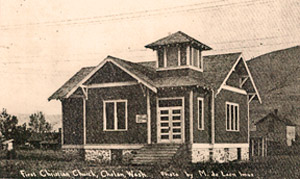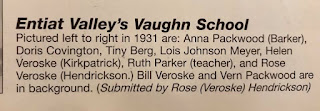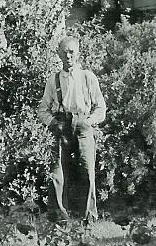 Looking Towards Heaven (Pictured above is a well-loved man, named Dad and Grandpa.)
**Note** This is the third of 10 articles that were written by my maternal Grandfather, Alfred Tennyson Vaughn before his death July 25, 1999. I didn't know they existed, until I did some family searching on the net and they came up. They were published in 2000 after his death. Needless to say, since I didn't know these were out there, I was in tears when I saw them. They are a cherished gift from Grandpa, who was a wonderful writer and poet! We love and miss you Grandpa!
Looking Towards Heaven (Pictured above is a well-loved man, named Dad and Grandpa.)
**Note** This is the third of 10 articles that were written by my maternal Grandfather, Alfred Tennyson Vaughn before his death July 25, 1999. I didn't know they existed, until I did some family searching on the net and they came up. They were published in 2000 after his death. Needless to say, since I didn't know these were out there, I was in tears when I saw them. They are a cherished gift from Grandpa, who was a wonderful writer and poet! We love and miss you Grandpa!
You can find the first parts of these series here:
Entiat #1
Entiat #2
Entiat #3
Entiat #4
Entiat #5
Entiat #6
That Old House
Entiat Pioneers
The Newcomer
Neighbors of the Valley
REMINISCING: The Vaughn Heritage
by
Alfred Tennyson Vaughn
Editor's note: This week, in the third installment of The Vaughn Heritage, we read about the coming to the Entiat area by the Vaughn family.
The Move to Entiat
Stanley and Flora were born at Medical Lake, and were small children when the folks moved westward to Knapps Landing, on the Columbia River near Wenatchee, about 1899.
Dad took charge of a station at the foot of Chelan Falls where wagon trains stopped for water and food. Bands of Indians also stopped there to rest up and eat their fill between hunting trips.
Silico Saska, a Wenatchee who lived at the confluence of the Columbia and the Entiat River. Part of Saska’s claim was sold to the founders of the town of Entiat in 1896; the rest was sold to orchardists after his death in 1903. He was one of the Indians that my great grandparents fed and took care of.
Dad fed hay to their horses, while Mother cooked food for the Indians. They usually stayed and ate until all the food supplies were almost gone, then went on their way. Father learned to talk Indian jargon and got to know many of the Indians of the Nespelem and Chelan tribes.
Uncle Bill Vaughn
William "Bill" Joseph Vaughn was born to the family in July 1900 while at Knapps Landing.
Uncle Daniel Jefferson Vaughn
Son of Cornelius Vaughn, Jr.
It was around this time that Dad's Uncle Dan Vaughn, son of Cornelius Vaughn, bought some land up the Entiat Valley from the Bonar homestead.
In 1901, Dad bought about 35 acres next to Uncle Dan. There was a two-room house and a cabin on the property when they moved in.
As the family grew through the years, so did the house. It was there that six other children were born and grew up.
Father was called upon to help build homes for many of the settlers in the valley. He also helped to build the Christian Church that stood by the graveyard on the hill above the valley.
As the children reached school age, Father helped to build what became known as the Vaughn School (Chelan County School District #37).
Classmates from the Vaughn School
It was there that all of our family went through grade school. It was there also where two of the older boys, Stanley and David, found young school marms who became their wives.
David & Dorothy (Harmon) Vaughn
Stanley & Florence Lillian (Rice) Vaughn
Florence Rice was one of the first school teachers there. She married
Stanley after he returned from France where he served in the Army in World War I.
Uncle Stanley George Vaughn, WWI.
Taken in France
Being the youngest of the nine children, and 18 years younger than Stanley, I have to depend on my brothers for events before my time.
One of the stories that Bill enjoyed telling was about when I was born.
Since we lived 10 miles up the valley and often 30 miles from the nearest doctor, the families in the valley often called on "Grandma Moe" as a nurse and midwife. She lived with her son-in-law and daughter, Tony and Rachel Johnson, about three miles away.
Grandma Moe had helped most of my brothers and sisters on their arrival in our home.
Now, it was my turn.
Eveleen Vaughn age 15
Dad called for Grandma Moe and sent Evaleen to get her in our horse and buggy. Then, all the younger children were sent out of the house to await my arrival.
When the loud cry and wailing began, the children looked all around for the blue jay they thought they heard. (Apparently sex education began at a later age then.)
Bill Vaughn
David Vaughn
Since Father was busy helping the nurse, Bill and David were sent to the upper field to take care of the farming. Uncle Dan happened to be in shouting distance, so they called him over to tell him about the new arrival.
Uncle Daniel Jefferson Vaughn
Uncle Dan thoughtfully listened, spit out some tobacco juice, then said, "You-uns tell yore Paw he should call it 'quits.'" Bill and Dave thought that really funny, so, as soon as they got back to the house, they told Dad what Uncle Dan had said.
Dad stared, said nothing, but turned red in the face. The next day, when Bill and Dave saw Uncle Dan next to the fence, he called them over to him and asked, "Did you-all tell yore Paw what ah said?" Of course they said they had. Uncle Dan spit again, then said, "Hmmmph. Ah thought you-all had bettah sense."
Of the 35 acres on the ranch, only about 18 was used for crops. Eight acres were in orchard, and the rest was used for garden and for hay.
Besides butchering our own beef and pork, our larder was supplemented by hunting and fishing.
Deer and bear as well as game birds were adequate for the sharpshooters that grew up there.
Our land was irrigated from a three-mile ditch that brought water from the Entiat River and shared with the neighbors. We were at the end of the line.
Each spring, Dad took some of us boys along to clean up and fix up the irrigation ditch for the summers. Neighbors also helped to maintain it.
For the house, we had running water. The boys took turns running to the river (about 100 feet away) with a pail or milk can in each hand. We needed three or four times as much water for wash days, although the folks had a place next to the river to do laundry on warm summer days.
The nearest electric power line came six miles short of our place. Our house was lighted by kerosene lamps and lanterns until gasoline lamps became available. One big room served as kitchen and dining room.
An old Monarch kitchen range fueled by wood provided our cooking year round, and helped heat the house during cold seasons.
Above photos are Joe & Eva J Vaughn
at their homestead in Entiat
Joe Vaughn
We also had pot bellied heaters in the other end and in the living room. The bedrooms were unheated.
If it was real cold, we warmed up bricks in the oven then wrapped them in newspapers and bags to warm our feet in bed. The kitchen was also our bathroom on Saturday nights, where we heated the water on the range and put enough in a round wash tub for each one to take their turn.
Next week: family activities and valley social events.




















































